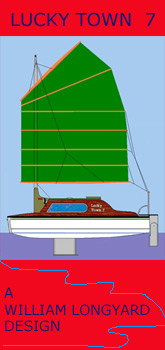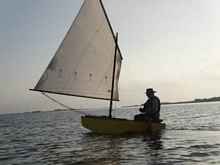
 Custom Search
|
| boat plans |
| canoe/kayak |
| electrical |
| epoxy/supplies |
| fasteners |
| gear |
| gift certificates |
| hardware |
| hatches/deckplates |
| media |
| paint/varnish |
| rope/line |
| rowing/sculling |
| sailmaking |
| sails |
| tools |
| join |
| home |
| indexes |
| classifieds |
| calendar |
| archives |
| about |
| links |
| Join Duckworks Get free newsletter CLICK HERE |
|
|
| Enlarged Life - Part Six |
by Wade Tarzia
- Connecticut - USA |
The 2014 Texas 200 in a Tiny BoatPart One - Part Two - Part Three - Part Four - Part Five - Part SixExpectations
They begin in our sacred weekends, constructs of the artificial reality of urbanized human hope. We over-schedule and over-imagine our weekends. We cram what we hope is "life" into the short gaps between the garrulous great extended family of Necessity. We have fights with our mates over what is to be done in the few precious moments of free will - if we have any. We live for the expectations of Saturday, and the diminishing possibilities of Sunday, whose free time is tinged gray by Monday. Our expectations are psychic capacitors charged to the killing point for more extended vacations. I approached the Puddle Duck, this box of a boat, with doubt garnished with excitement. I didn't know what to expect, feared the misery half-seriously prophesied for the venture. I will not underplay the long hours of discomfort and concentration required to sail a Duck during this little adventure, nor will I forget the unexpected respect the boat earned over those days, so that when I helped John and Andy load her on the trailer for her ride home, I unabashedly kissed her deck, giving thanks for the ride, and nobody made fun of me. But expectation is a harsh mistress. On the fourth night at Army Hole I expected a glorious sleep and an easy fifth and final day of sailing. It began inauspiciously coming into Army Hole having to tow the boat through the usual shallows (which by now were becoming metaphors of cosmic determent) and falling into the channel to the neck right before a shore of reeds sprouting from that mud which sticks and regenerates itself beyond the Law of Conservation of Energy - all of this as delightful as a holding pond for sewerage that had simmered long in the sun. Later on in camp I heard someone mutter, "I wonder where the resident alligator is?" I didn't get that memo. The night was full of expectations that did come true: a clean-up, time to set up a tent with some left over to finally socialize a little with Pehr nearby, who spilled welcome corn chips into my hands, and later a ramble with Michael and Kellen to the abandoned World War II airstrip out in the bushes, a place as eerie as a forgotten Twilight Zone set and stranger than the story it had told; surely I heard a lost B17 forever on its training run from Hell, locked in its loop of failed landings - so like actual life, I guess. Exxxxxcellent! Later I fell into the tent, and heard the promise of thunder in the distance, didn't fall asleep until 2 o'clock in the morning, and slept for 15 minutes and awoke to the need to hurriedly stretch the rain fly across as the wind whipped up to 40 knots. I held up the tent against collapsing with upended feet. After the storm, loud conversationalists killed expectations for even one cycle of REM sleep, all of that drifting downwind in the tattered clouds. The final expectation was to be an easy 25 miles of sailing into a feast on the beach at Magnolia. What actually happened this day was proof that a brief period of misery and struggle becomes magnified beyond its temporal proportion; students of epics, attend. The day started off well, but then we lost the wind, plodded into the 4 mile intracoastal waterway canal near Port O'Connor, and the day really started. Attempts to tack in the canal (deeply sunk under a bank on one side and homes on the other) resulted in a lost 60 feet with each turn. Kellen was making some progress in his boat, which seemed well set up for rowing, so I unlimbered my two clubs and rowed until the oar locks pulled out of their screw holes; "Expectations for screws, check." I beached the boat and ruminated. Walking it up the canal a few miles - if it were even possible, I didn't know - was not appealing, and anyway the way was blocked by a construction boom that extended out into the deep water of the channel; the other side was an endless row of condos under construction, set flush on concrete bastions. Michael drew up his boat, and then we started looking hopefully at a few people getting tows up the canal. I ceded the first offer to Mike, because I had John on the telephone who could, if he had to, drive to this area to pick me up. The expectation of finishing the race on the boat was added to the doubtful checklist. But I did get my tow, from the person who rescued me from missing the beach at Paul's Mott. Gordo towed me and the folding schooner up the canal, and then shook his head when I told him to drop me off at the foot of the jetty with the other Puddle Ducks. Crazy, yes, I thought about that a lot in the next hour or so, but I had to resume the trip with the Duckers. I have no tolerance for public shame; bad enough I got a tow. The wind was in our face, the channel offered about hundred feet of tacking room, and the current was stronger than ever, now unimpeded from the friction of miles of canal walls. We all expected to tack, and tack we did zigzagging against the light wind, and with each tack I was again going backwards. Then back to the jetties, where the other Puddle Duck crews were walking the boats up the rocks - most of them walked the boats right up to the end and launched there, eventually. We all felt our ways among submerged granite boulders, occasionally falling in the gaps between them over our heads. I kept a death grip on the painter, by which I was pulling myself up from the cracks of doom to find footing. I expected to rip my flesh as I teetered on the edge of the barnacle encrusted blocks (check: that last bruise is just now fading a year later), towing the boat, attempting to balance, trying to remember my old rock climbing skills, trying not to abrade away the skin of the boat on nature's 20 grit sandpaper. The jetty is about a third of a nautical mile long, and I towed the boat only about two-thirds of that, yet so exhausted I expected to die as 5 days of sleep deprivation, heat, and attentive sailing suddenly broke my will. The only good thing was that there is no room to be beaten to your knees at an angle between a rock and a wet place. Ahead of me I saw John Goodman making good progress up the jetty, which made me briefly hate him (nothing personal, just business). Extreme annoyance pushed me to further progress, and barnacles left bits of Tricia's plywood floating downstream, primed with a little blood in the tradition of Charybdis. Then I collapsed again, panting. I hadn't been this tired since pedaling a 100 miles in a blizzard-gale along the Scottish coast when I was an indestructible young man. Adventures are brutal life-clocks. I knew the others were having some success and less success, but my personal reaction to stress is to become the center of the universe. Very, very bad words jerked from my teeth as I jumped into the boat and pushed off. I did the most serious, calculated specific, precise beating against the wind in my eclectic history as a sailor. The brain is capable of astounding feats of calculation-let out the boom another 1.5 degrees, keep the luff 7 micrometers away from fluttering, get to windward in small but positive nibbles of that life-giving nectar known as course-made-good. Unfamiliar rocks became my best friend, offering evidence that hope was not lost, that I could make progress in increments of 10 and 15 feet - "Yessss! I didn't see that boulder during the last tack!" - which became the 10 and 15 feet on a gigantic ruler, inches expanded to yards, a cosmic ruler, and finally the rounding of the corner, and I made some kind of croaking noise of triumph. Some expectations come true - I would probably reach Magnolia Beach in the boat. I did, not without feeling especially annoyed by the remaining 10 miles of sailing. As we paused hardly a 1000 feet from the finish to rally the Duck fleet so we could make a true Hollywood special-effects landing, all I had left was half-hearted whining, "What are we waiting for? There it is, the end, the end, don't you see it? It is possible for this to be over, and there is cold beer, and a place to walk that is not mud or rip-rap, and if we are very lucky the people there will not tear us to pieces to the tune of a brass band like the cruel ending at the end of Ray Bradbury's classic story, "Mars is Heaven!" Or something like that. But ultimately it was done and:
(Out of morbid curiosity, I looked at my GPS ground track from after I quit hauling the 'Duck along the Port O'Connor jetty and tacked out. From about three-quarters of the way out from the jetty my tacks were ~65 degrees off the wind (CMG) though I was pinching up as high as I could go while maintaining about 2 knots.) The beach, the boats pulled up, a boiled shrimp supper in the pitiful shade of some bush shared with Michael. Some memories of giving away any gear I hadn't the patience to pack like a mathematical puzzle into the duffel and carry through the airport again, hurriedly finding and reminding my ride to the hotel, and looking for my comrades for an unsatisfactorily quick good bye. I don't know what I could expect; maybe a hard handshake and some few words are as good as it gets. No, as it goods as it gets is when John, whose attention I have not been able to get as he checks on the condition of all the boats he built for the fundraiser, at last finds me, and says, "Well, I am impressed," and something more about having worried about my "soft Yankee skin," and all my mistakes and grievances evaporate. I try to carry my side of the conversation with Brian for the two hour ride inland. Dehydration makes me fuzzy - I've been peeing brownish-green, and bottles of water sucked down hardly take the edge off. The hotel is a blurred memory of moldy smelling clothes heaped in the bathtub, a bed, cool air.
And in ConclusionI must have been terribly well satisfied by this little adventure, because I felt no motivation to write about it for most of a year. I was conscious that the cruise took some effort (for a soft-skinned Yankee!) and was proud to have done it in company with fine and interesting people - without some of them, I could not had the experience. Eventually the need to narrate reawakened; we must tell stories to extract meaning from the chaos, stories like a campfire in a vast darkness. With enough stories told, each culture synthesizes its image of reality; if the image is good enough, the culture probably survives. Be wary of the stories you tell - will they build, will they tear down and offer nothing worthy in place? Luckily the Texas 200 and things like it are builders of damned positively good monuments - adventures for that most fortunate of social classes in the world, who are well enough to have a sail boat and drive to use it; poor enough to have had to work for it and make ruthless decisions about how to spend free time. Our adventures mean a lot even if we must narrate them to make them real - the Heisenberg Uncertainty Principle applied to everyday life! Adventure, a problem-word! I have heard that only fools have adventures; maybe that pertains to those poorly planned jaunts when you take an afternoon hike and nearly die of thirst, and to those wonderful idiots who dive through pin-holes in mountain tops in their flying-squirrel-para-suits or mountain-bike on the edge of precipices. Adventure! My doctor remarking I had lost 5 pounds since the last visit wanted an explanation; I was just back from a rainy cold November of bicycling, camping, and folklore study in Ireland. "Quite an adventure!" he said. Nothing ever seems simple to me; my answer puzzled him as I tried to figure this out. "No, an adventure is when a giant wave clears the rigging from the deck and you have to think seriously about living; I just had an interesting good time." Doc didn't try further small talk. Adventure! My heroes are Jacques Cousteau and Tim Severin who formed my sense of what the thing should be. Yet these guys' accomplishments will beat you down if you're not careful - their lives are off the scale. I suddenly wept while driving home from work as the radio news reported the death of Cousteau. It wasn't all or even mostly about this man, who could have checked out nearly any time and been considered utterly fulfilled. It was possibly about comparing reality to ideals, and that drive home from work, like a thousand other drives, a comfortable mortgage, taken-for-granted family, a course for the future that suddenly seemed predictable, thus terrifying. I needn't have worried so much. A few years later the unpredictable: divorce, gentile poverty, stroke. Death pointed to the pile of dusty wood in my apartment and handed me a saw. The first-boat-build began, a boat made in a bedroom, gotten out the twisty stairs in several pieces, the rig out a window. It was a horrible boat, it was the best boat. It shocked small adventure to life. Adventure is a philosopher's stone: one of the things you would want carved into your memorial. But of course, the type of person likely to be reading this has already won the prize, in a sense. You, like me, have been on boats, had time to enjoy life, you are healthy enough to be sitting up with a computer and reading this essay, probably free of immediate worry of plague, death-squads, and bombs. So I was haunted by the following summation of reality for the people from whom our interests originate, which makes an afterword to my toy-epic. It speaks from the first Paleolithic ancestor to wade a log into a marsh to the working water-folk who still exist:
|
To comment on Duckworks articles, please visit one of the following:
|
 |




